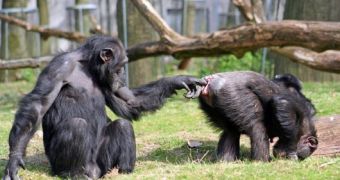Do chimps have senile grandmas? A comprehensive research has attempted to see whether wild female chimpanzees experience menopause or not.
After 35 years of age, women experience a drop in their fertility as the oocytes (undeveloped eggs) reserve empties, and at an average age of 51, when only about 1000 oocytes remain in the ovaries, ovulation stops definitely. Still, women live on average another 30 years. But, 90% of the chimps die around the age of 40, that's why menopause existence is hard to be assessed in them.
The research team included Harvard University anthropologist Melissa Emery Thompson, but also Richard Wrangham and famous Jane Goodall, and used data gathered from 185 wild female chimpanzees over several decades. The research published in "Current Biology" was made on 34 chimp females older than 40, but about 50 % of them gave birth, one even at the age of 55.
"In contrast to humans, fertility in wild chimpanzees seems to senesce at the same pace as the rest of the body. It's a completely normal mammalian pattern, just like cardiac function will decline with age", said Thompson.
"The new data add compelling support for her long-held contention that the important difference between female chimpanzees and women is not the rate at which their oocyte pools shrink but adult mortality", said anthropologist Kristen Hawkes, of the University of Utah in Salt Lake City, whose team discovered earlier this year that depletion of oocytes in humans and chimps occurred at about the same rate; but the oldest female chimp in their research was just 47 years old. "Do most adult female chimpanzees go through menopause? No, they die first", said Hawkes.
But many of the older chimps in the new research were fertile.
"We don't know at what age reproduction would stop in chimps because there's no indication of an age at which they cannot reproduce. Wild elephants, which live about 10 years longer than chimpanzees, give birth into their 60s, indicating that the age of oocytes (which females make before they're born) does not limit reproduction, as some have posited about mammals", said Thompson.
The decline of fertility with the age, in both humans and chimpanzees, suggest that our common ancestor likely reproduced less with the age.
The unique long menopause of women could be an evolutionary trait, as grandmas help their daughters raise their offspring, which in the end also carry their genes, and boost this way their own biological success. "With chimpanzees, there's no real grandmothering", said Thompson.

 14 DAY TRIAL //
14 DAY TRIAL //